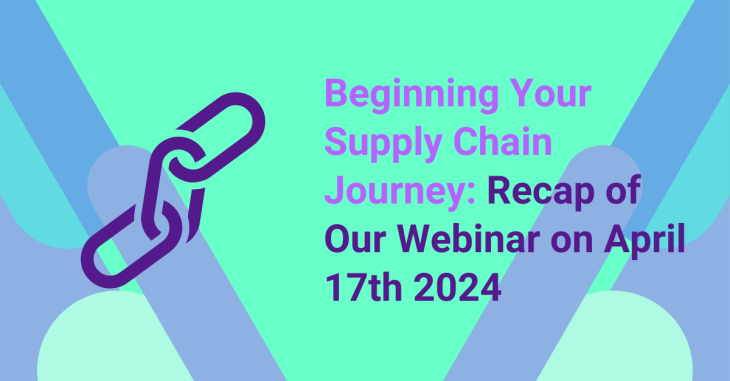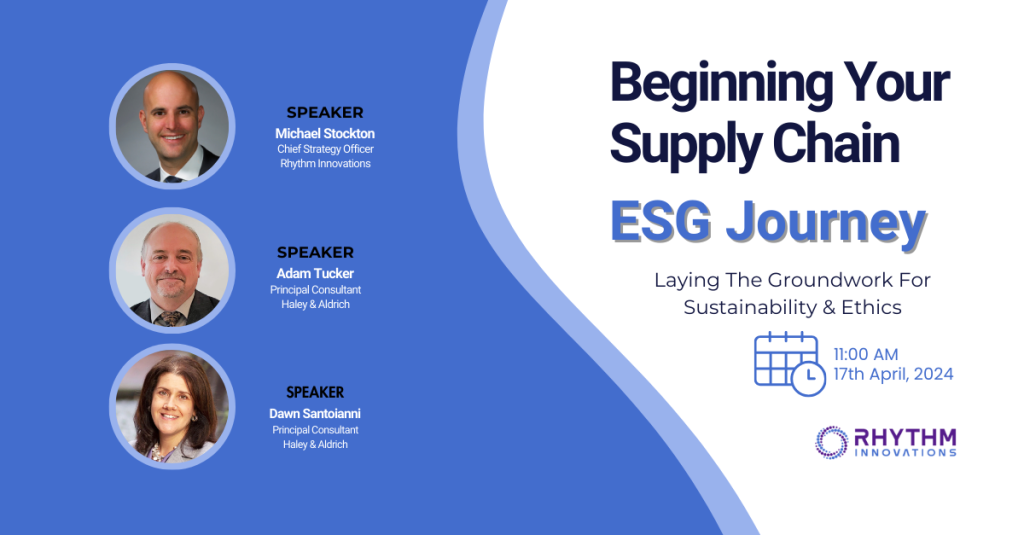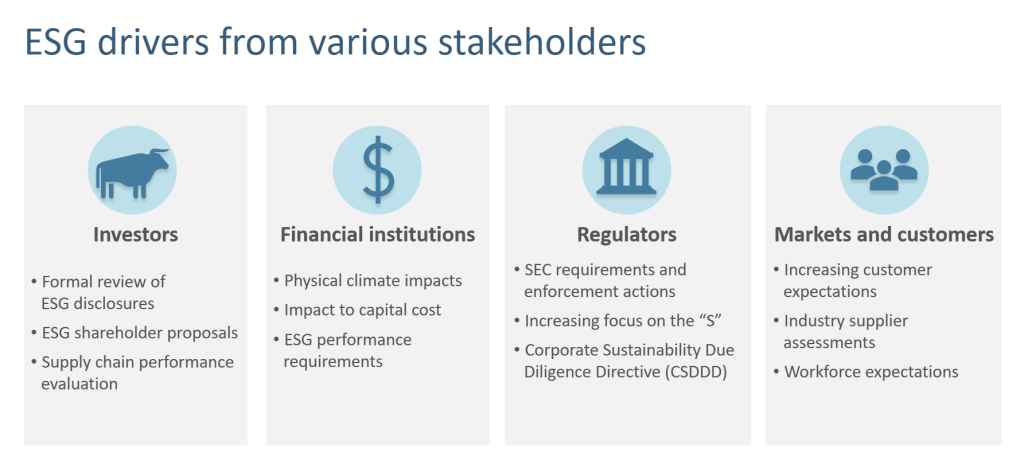Beginning Your Supply Chain ESG Journey: Recap of Our Webinar on April 17th, 2024

On April 17th, 2024, Rhythm Innovations hosted a webinar where industry experts discussed managing supply chain risk and ESG data challenges. The webinar was led by Michael Stockton, Chief Strategy Officer from Rhythm Innovations. Joining him from Haley & Aldrich were Adam Tucker, Principal Consultant, and Dawn Santoianni, Principal Consultant. The discussion provided valuable strategies for enabling supply chain engagement. For those unable to attend, here’s a recap of the key insights shared during the session. Watch the webinar recording here.
Managing a supply chain responsibly is essential for the success of any business. However, this task is becoming more complex due to many challenges, particularly in the areas of risk management and sustainability.

The Critical Need for ESG Action
The global urgency for ESG (Environmental, Social, and Governance) action has reached unprecedented levels. This is underscored by a staggering 647% increase in ESG regulations since the turn of the millennium. This reflects a growing recognition of the need for corporations to prioritize sustainability, ethics, and social responsibility in their operations.
One significant area of focus is the eradication of modern slavery, with several countries worldwide actively addressing this issue. Governments have implemented strict regulations to combat human rights abuses and ensure fair treatment across supply chains.
In March 2024, the SEC finalized a groundbreaking climate disclosure rule, marking a pivotal moment for corporate transparency. This rule mandates companies to disclose climate-related risks and impacts, aligning financial reporting with climate goals to help stakeholders make informed decisions.
Furthermore, the Corporate Sustainability Reporting Directive (CSRD) has been introduced, compelling EU-based companies and companies with a significant presence in the EU to report comprehensively on their ESG impacts.
As regulatory frameworks evolve and stakeholder expectations continue to rise, companies must embrace their role as agents of positive change, driving meaningful impact on both societal and environmental fronts.
How Materiality Applies to Your Supply Chain
Materiality refers to identifying and understanding the issues most relevant and impactful, both positively and negatively, to your organization and its stakeholders. Here’s how materiality applies to your supply chain and why it’s crucial for your business:
- Mitigating and Avoiding Risks: Understanding material issues in your supply chain allows you to anticipate and address potential risks before they escalate. By identifying suppliers with poor labor practices or high greenhouse gas emissions, you can take proactive measures to mitigate these risks.
- Identifying and Pursuing Opportunities: A materiality assessment helps identify opportunities for innovation, efficiency, and competitive advantage within your supply chain. For example, by recognizing the importance of resource use efficiency, you may discover ways to reduce waste and cut costs.
- Prioritizing Actions and Investments: By focusing on material issues, prioritization can occur on how to best allocate resources and efforts. This ensures that actions and investments are directed towards areas that will have the greatest impact on your business. Whether it’s investing in renewable energy sources or implementing diversity programs, prioritizing material issues ensures your resources are effectively utilized.
- Improving Disclosures: A materiality assessment also enhances transparency and accountability in your supply chain disclosures. By accurately reporting on the issues that matter most, you build trust and credibility with investors, customers, and other stakeholders. Clear and comprehensive disclosures demonstrate your commitment to sustainability and responsible business practices.
Some key ESG issues in the supply chain include:
- GHG Emissions: Assessing and reducing greenhouse gas emissions throughout the supply chain is crucial for combating climate change and meeting emissions reduction targets.
- Resource Use: Efficient use of resources such as water, energy, and raw materials helps minimize environmental impact and reduces costs.
- Waste Management: Proper management of waste, including recycling and waste reduction initiatives, promotes resource conservation and minimizes environmental pollution.
- Diversity, Equity, and Inclusion (DEI): Promoting diversity, equity, and inclusion in the supply chain fosters a more inclusive workplace and strengthens relationships with diverse stakeholders.
- Labor and Human Rights: Ensuring fair labor practices and upholding human rights standards throughout the supply chain is essential for ethical sourcing.
- Safety: Prioritizing safety measures in the supply chain protects workers and stakeholders from accidents and injuries, fostering a safe working environment.
Current Challenges of Managing Supply Chain Risk & ESG Data
Manual Data Collection
One of the primary challenges faced by supply chain managers is the manual collection of data. Traditionally, data collection involves cumbersome processes such as Excel spreadsheets, email communications, and in-house platforms. These methods are time-consuming and are prone to errors and inconsistencies, making it difficult to obtain correct and reliable information.
Lack of Centralized System of Record
Another significant hurdle is the absence of a centralized system of record for supply chain data. Without a sole source of truth, organizations struggle to merge and organize data effectively. This fragmentation hampers decision-making processes and impedes the ability to find and mitigate risks promptly.
Poor Supplier Engagement
Supplier engagement is crucial for fostering transparency and accountability throughout the supply chain. However, many organizations face challenges in this area, including low response rates and ineffective follow-up mechanisms. As a result, gaining meaningful insights into supplier practices and performance becomes exceedingly difficult
Limited Insights & Actions
Even when data is collected, the lack of actionable insights poses a significant barrier to effective supply chain management. Without the ability to analyze data comprehensively, organizations cannot identify emerging risks or improvement opportunities. As a result, they may miss potential cost savings, operational efficiencies, or strategic advantages.
Slow and Inaccurate Stakeholder Reporting
Finally, the process of stakeholder reporting is often slow, inaccurate, and fraught with audit risks. Manual reporting methods increase the likelihood of errors, undermining the credibility of sustainability initiatives and exposing organizations to reputational damage.

Strategies for Success
During the webinar, several strategies were discussed to address these challenges and ease supply chain engagement:
- Implementing Technology Solutions: Investing in technology solutions such as supply chain management software can streamline data collection, aggregation, and analysis processes. The Rhythm Innovations platform enables real-time insights, facilitating informed decisions with accurate centralized data.
- Enhancing Supplier Collaboration: Building strong relationships with suppliers is essential for improving engagement and transparency within the supply chain. Organizations can achieve this by implementing supplier development programs, conducting regular assessments, and fostering open communication channels.
- Leveraging Data Analytics: Harnessing the power of data analytics allows organizations to extract valuable insights from their supply chain data. Using advanced analytics, businesses identify patterns, trends, and anomalies, revealing potential risks or improvement opportunities within their operations.
- Automating Reporting Processes: Automating stakeholder reporting processes can help organizations improve the accuracy, timeliness, and reliability of their sustainability disclosures.
The escalating global demand for ESG action underscores the urgency for corporations to prioritize sustainability and ethical practices. With regulatory frameworks evolving, companies must embrace their role as agents of positive change, driving meaningful impact on environmental fronts. By aligning goals with material concerns in the supply chain, businesses can mitigate risks and identify opportunities in their operations. Despite current challenges such as manual data collection, lack of centralized systems, and poor supplier engagement, current opportunities including technology adoption, supplier collaboration, data analytics, and automation offer pathways to success.
How Rhythm Can Help
Rhythm Innovations offers vital solutions for businesses tackling the challenges of Supply Chain ESG, risk and sustainability. Our software streamlines data management, centralizes information, and provides valuable insights for prompt decision-making. Rhythm Innovations enhances Supplier Engagement through increases transparency and accountability, empowering businesses to navigate the complexities of supply chain management with ease.


